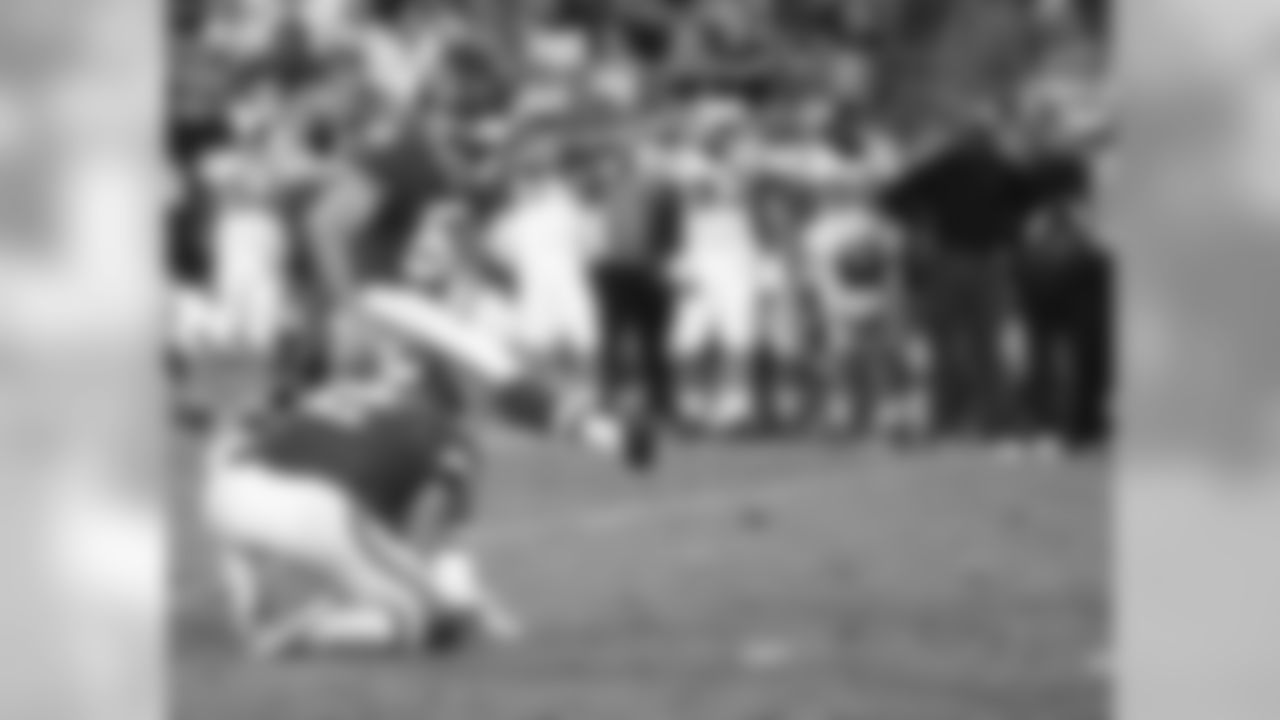It started from pure curiosity.
An exchange student, 4,300 miles from his home of Sau Paulo, Brazil, was asked to try kicking a football instead of a soccer ball.
At 15 years old, new Kansas City Chiefs kicker Cairo Santos left his mom, dad and sister in Brazil for an unknown journey to the United States.

It was a student exchange program that sent Cairo to St. Joseph Academy Catholic High School in St. Augustine, Florida.
Only a week before he left everything he's ever known—his family and the comfortable surroundings of his home country—it was only then that Cairo learned of the family he'd be staying with in Florida.
A family he'd later call his own and one that would help him through an unspeakable tragedy.
Tyler Burnett was an athlete himself—earning a scholarship to play basketball at Lynchburg College in Virginia.
Growing up as an only child, Tyler lived with his parents, David and Kathy Burnett, in St. Augustine, which sits 40 miles south of Jacksonville, Florida.
Tyler attended St. Joseph's Academy and one day, the school phoned his parents. They needed help.
Three exchange students were coming for the school year and there was no place for them to live. One of those students was Cairo.
The Burnetts agreed to take in Cairo, who was looking forward to the opportunity to play soccer at St. Joseph Academy, and Tyler admitted the language barrier was difficult at first between him and Cairo.
Cairo knew some English, but his accent was heavy and it wasn't something he was comfortable with at the beginning.
Out of pure curiosity on Tyler's part, one day he was out front playing basketball with some friends, and a simple request changed the trajectory of one 15-year-old's life, even if he didn't realize it at the time.
"My friend and I were training in my front yard, shooting and doing some drills," Tyler Burnett explained. "[Cairo] came out and he was just dribbling the soccer ball. I had a football there and we saw him kick it a little bit and we kind of said 'Hey. Can you kick this football down the road?'
The best photos of Kansas City Chiefs kicker Cairo Santos (5) during 2014 training camp and preseason.

The best photos of Kansas City Chiefs kicker Cairo Santos (5) during 2014 training camp and preseason.

The best photos of Kansas City Chiefs kicker Cairo Santos (5) during 2014 training camp and preseason.

The best photos of Kansas City Chiefs kicker Cairo Santos (5) during 2014 training camp and preseason.

The best photos of Kansas City Chiefs kicker Cairo Santos (5) during 2014 training camp and preseason.

The best photos of Kansas City Chiefs kicker Cairo Santos (5) during 2014 training camp and preseason.

The best photos of Kansas City Chiefs kicker Cairo Santos (5) during 2014 training camp and preseason.

The best photos of Kansas City Chiefs kicker Cairo Santos (5) during 2014 training camp and preseason.

The best photos of Kansas City Chiefs kicker Cairo Santos (5) during 2014 training camp and preseason.

The best photos of Kansas City Chiefs kicker Cairo Santos (5) during 2014 training camp and preseason.

The best photos of Kansas City Chiefs kicker Cairo Santos (5) during 2014 training camp and preseason.

The best photos of Kansas City Chiefs kicker Cairo Santos (5) during 2014 training camp and preseason.

The best photos of Kansas City Chiefs kicker Cairo Santos (5) during 2014 training camp and preseason.

The best photos of Kansas City Chiefs kicker Cairo Santos (5) during 2014 training camp and preseason.

The best photos of Kansas City Chiefs kicker Cairo Santos (5) during 2014 training camp and preseason.
"And so I held it for him. One of my friends went out to catch it for him and he just killed it. So we convinced him to go out for the team and that's how it all got started. It's kind of a funny story—kicking on the concrete."
The first time Cairo ever kicked a football was on a concrete street into the distance, simply because his host-brother was curious about how well this Brazilian soccer exchange student could kick a football.
What was supposed to be just one year away from his family with the exchange program in the United States suddenly became two years and then longer.
To this day, Cairo admits his life might be completely different had Tyler not asked him to do that more than 10 years ago.
"I'd probably be playing soccer somewhere," Cairo said. "I did have a scholarship to play soccer, so if I didn't, I don't know if I would have even come back for the two other years. Because of football, I decided to come back for two more years of high school. So maybe, yeah, I 'd still be in Brazil trying to play soccer."
Having never played American football before, Cairo knew after he agreed to play for St. Joseph that he had a lot to learn.
To learn the game, he turned to the most obvious teaching tool in any teenager's life—a video game.
"I went out and bought a Madden game for my X-Box," Cairo laughingly said. "That's how I learned the rules, the positions and the players."
His host-dad, or as he described, his "US dad," David Burnett, remembers a teenage Cairo for more than how he learned the sport he's now beginning a career in.
David recalls his first impression of Cairo when he showed up at his house so many years ago.

"A brave, young man," he said. "You could see he was nervous and scared, but we kind of respected right away his ability to handle everything.
"He was he's a pretty strong kid to leave his family and culture and come over here and not only stick it out, but obviously excel, which is what he did. He's just definitely always had this ability to handle situations as they kind of fall. I think that's what makes him such a good kicker is the ability to handle pressure."
Before there was American football, game-winning field goals and athletic success in the United States, there was family in Brazil.
Cairo's sister, Talita, is just one year older and recalls Cairo always kicking a ball around when they were kids in Brazil and sometimes needing her help.
"I remember at our house when were kids, he always kicked the ball into our neighbor's [yard]," Talita Santos said. "I remember that he would ask me to get the ball back because he already asked 1,000 times and the neighbor wasn't happy. He was always kicking the ball so high and my mom always joked that he was training to become a kicker."
Talita remembered the day Cairo left for the United States.
"I cried for a week," she said. "I never expected to miss him so much because we were kids and we were always fighting. But it was very hard because I only have him. It's very hard for everybody to be so far away from him, but we were very happy that he was happy about this new step of his life."
Even though he was 4,300 miles away in another country, Talita, along with their mother, Magalie, and father, Cairo Sr., found ways to stay in touch with Cairo.

"The first two months I had to Skype my parents and my sister a lot," Cairo said. "But then I got adjusted pretty quickly and English was getting better too. That was something that made me nervous a lot because I couldn't understand people that well."
Tyler remembers the day they picked up Cairo from the airport coming from Brazil. They got pizza and it didn't sit too well with Cairo.
"It was tough to getting used to eating when it's not your mom's food," Cairo said.
Sending your only sibling and son off to the United States in this exchange program wasn't easy for the Santos family, but after meeting the Burnetts, Talita said the family felt better about the situation.
"Kathy and David were very supportive," Talita said. "I think he learned a lot from them about becoming the independent man he is now. They were so great to him and we were relieved that he was in such a great place."
What started off as just a one-year exchange program and host family in Florida for Cairo later became much more.
Cairo's relationship with his sister was built over years together in Brazil.
"Cairo was always the nicest person to everybody," Talita said. "I was always the stressed-out sibling and he was always so kind to me and I love him. He's so good and when he went to the United States, he was so nervous because he's a shy person."
That shyness, combined with an unconfident grasp of speaking and understanding English, made for a tricky relationship early on with his host brother, Tyler.

"We started out talking here and there and it came to where we were friends, and then eventually turned into brothers," Tyler explained. "The more and more he learned English, he kind of grew out of his shell so he definitely is a really funny kid once you get to know him."
He grew out of that shell and kept excelling on the football field at St. Joseph Academy and was offered a full-ride scholarship to Tulane to kick for the Green Wave.
From kicking off of concrete to learning the rules of football from a video game, Cairo had come a long way to earn this opportunity at Tulane, and it's one he took advantage of.
Cairo kicked all four years of his college career, finishing with the best field goal percentage (.782) in school history. He connected on 61 of 78 attempts, also kicking off 190 times with 78 touchbacks.
In 2012, Cairo won the Lou Groza award, an honor given to the nation's best collegiate kicker.
Throughout his time at Tulane, Cairo found his way back to the family that had opened their home to him just a few years prior.
"He just never left to be honest," David explained. "He came back through college on breaks and holidays and the summer; he still had come and lived in our place because like I said, he's just like one of our kids."

Having two families was something Cairo enjoyed.
"It was great," Cairo said. "I Skyped them both throughout the weeks and whenever I had vacation or a fall break or anything, I went back to St. Augustine to be with my host family, so it was awesome just to have two families here that when I had bigger vacations, I'd go to Brazil.
"So to have two families, that's something that not a lot of people do and it's just awesome to have people that care about you."
During his junior year, along with the Lou Groza award, Cairo was named a consensus All-American, connecting on 21 consecutive field goals to finish out the season.
The NCAA record was 30 in a row—a record within reach for Cairo.
Then on September 15, 2013, midway through his senior year at Tulane, an unspeakable tragedy happened to the Santos family.
Cairo recalls that day.
"My mom usually calls me every Sunday from Brazil and I always talked to my dad and my sister on that Sunday call," Cairo said. "My mom called me that night and I remember I was watching a football game—Sunday night football. I thought it was just a routine call to check on me and then she told me, 'I have terrible news.'"
Cairo's father, Cairo Santos Sr., who was a stunt pilot in Brazil, had been killed in an accident while performing a stunt.
Upon hearing the tragic news, David and Kathy Burnett immediately left for New Orleans to be with Cairo, who didn't sleep at all Sunday night before meeting with his coaches at Tulane Monday morning.
They worked out a deal with the NCAA and flew Cairo home to Brazil to be with his family.
"It was very hard actually because I remember when my mom told me, she was a little bit nervous to tell Cairo because Cairo was in a good place in his school," Talita said. "He wasn't missing his field goals and his kicks."

Cairo attended his father's funeral on Tuesday.
On Thursday of that week, Cairo spoke with his coaches at Tulane, who told him to take as much time as he wanted before returning.
The team was set to play Syracuse that Saturday in New York.
"I said I wanted to play," Cairo explained. "I want to go and do what my dad always told me to do. So I flew to Syracuse and continued my season."
His host father, David, who back then and to this day considers Cairo a son, felt a responsibility to be there for whatever Cairo needed.
"You can never replace somebody's biological parents," David said. "But I'm trying to certainly step in and be that person to help him through the ups and downs of life."
Against Syracuse, Cairo hit his first field goal, which brought him to 26 straight field goals, just four shy of the NCAA record.
But on his second attempt from just 32 yards, the kick was blocked and the streak ended at 26.
Less than a week after his father's funeral, Cairo traveled from Brazil to New York on a Friday and kicked on Saturday. Unfortunately, that was the day his streak ended.
But it showed everyone that playing football was more than just something Cairo was good at—it meant something more to him.
The next week at UL Monroe, Cairo hit a 56-yard field goal in a 31-14 win for Tulane.
A week later against North Texas, Cairo hit a 27-yard game-winner with five seconds remaining.
Then, for the third consecutive week, Cairo did something on the football field that served as more than a note in a box score for him personally. In the third overtime, Cairo hit a 42-yard field goal to win the game.
But those kicks were more than just game-winners; they were cathartic for Cairo.
"I remember the emotion I had after those kicks," Cairo said. "It allowed me to kind of see the light again and wanted to keep playing and keep doing it. So it ended up being a good moment in my life."
Talita recalls her father's pride for Cairo and how her mom helped keep them together.
"My dad was his number one fan and it was very difficult," Talita said. "But I think my mom is a very strong person. Her faith is very strong and I think this is what held us together. They are both my rock because they are very, very strong."
Through tragedy, there was triumph.
Years ago, when Cairo was making the decision between a football or soccer scholarship coming out of St. Joseph Academy, it was his father who pushed American football.

Cairo recalled his father's words.
"You're Brazilian, you've been kicking a ball since you're two years old—I think you can be more of a standout player there so I think you should pursue football."
The opportunity came for Cairo with the Kansas City Chiefs. He was signed as an undrafted free agent after a stellar collegiate career.
Back in May, when Cairo was getting ready for his first opportunity to show the Chiefs what he could do in OTAs, Talita and his mother came to help him pack for the trip.
"We helped him pack for Kansas City and he was very nervous because he was afraid that he was packing too many clothes," Talita said. "He was like 'Mom you're packing too much. I'm going to be there for just a few months.' My mom said 'No. I looked at the weather there. Take everything you own.'
"A week later, he called us and he's like 'Mom. Everybody had just one suitcase and I had a bunch.'"
Through OTAs and training camp, Cairo battled with five-year Chiefs veteran Ryan Succop for the kicking job.
Ultimately won by Cairo, Talita recalls the moment she found out he had won the job.
"Actually when he told me, I was at a birthday party with all of his friends from Brazil," Talita said. "I told everyone and I was crying and everybody was hugging me. I was just like 'My little brother's in the NFL!' It's very surreal. But we were so happy about it and we couldn't be more proud of him."
Talita even found humor in the little things.
"He has his own Wikipedia," Talita joked. "I can't believe my little brother has his own Wikipedia."

But for Cairo, it's the memory of his father, not learning and excelling in a sport he knew nothing about, traveling 4,300 miles to be surrounded by people he had never met or deciding between the sport of his home country and one he learned from a video game, that means everything.
"We talked about how proud my dad would be at this moment," Cairo said. "And I know he is and he's watching me from a great place and proud of me. He was always a great fan, always loved to follow me. We talked about plans of if I did have a career here, then for my parents to move here and watch me from close.

"But to me, it's sad. It hurts that I can't share my proudest moment and the best moment of my life with such a person I admire my whole life. But I do it for him. I'm here every day working to be able to help my family, help my mom and one day bring her here and that's pretty much what I live for—my mom and sister."
Cairo's other father, David, recalled the tears in his eyes when he learned the news of Cairo winning the job, right before texting over 100 friends and family of the good news.
David said he was the first to get a Cairo Santos Chiefs jersey, buying one for both he and Tyler, and that he'll keep his nervous tradition of watching Cairo play.
"I stand up and I get nervous when he kicks," David said. "I always have. So when I go to go to a game, I tell people behind me, 'I know most of you don't like kickers but any kicks I have to stand up.' So, I can't sit down. I'll continue that tradition for sure."
For Cairo, it's simple.
"Every kick, I do it for my family."













